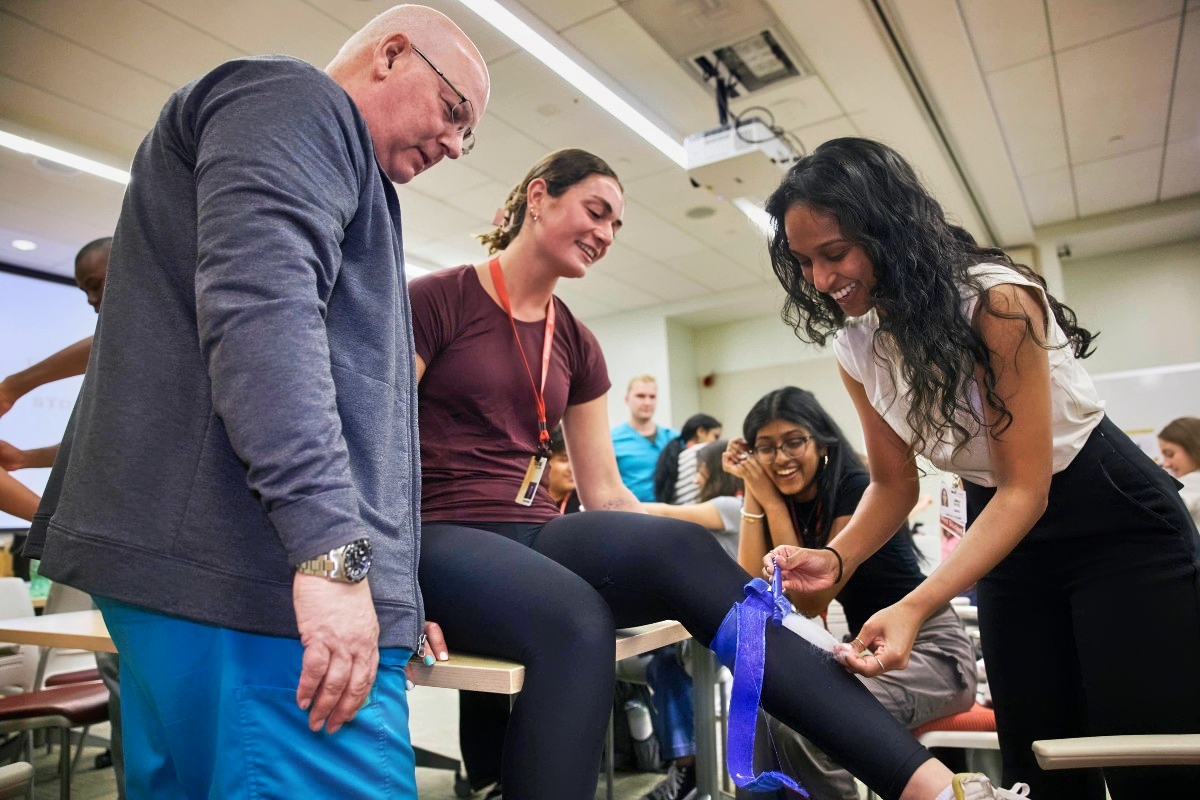Mentors in scrubs: How medical students are inspiring the next generation through CMSRU’s MEDacademy
Mentors in scrubs: How medical students are inspiring the next generation through CMSRU’s MEDacademy

Umali Patel, a second-year medical student at Cooper Medical School of Rowan University (CMSRU), was in for a surprise halfway through her term as a teaching assistant for MEDacademy. After returning to the classroom from a series of one-on-one meetings with her students, she found them lined up holding handmade signs that read “We ♡ Umali.”
“It was a coordinated surprise — and a really sweet gesture,” said Patel, a 2023 graduate of Rowan University’s 3+4 Accelerated BS/MD program. “Moments like that remind me how close the students get — not just to us, but to each other. That sense of trust and camaraderie really makes the experience special.”
Every summer, CMSRU welcomes a select group of 45 to 50 rising high school juniors and seniors to campus for MEDacademy, an immersive four-week program designed to simulate the rigors and rewards of medical school. The experience is fast-paced and hands-on, with students studying biology and science, learning anatomy, mastering clinical skills, and even earning college credit from Rowan University. They also participate in nationally recognized training sessions like Stop the Bleed, a program that teaches lifesaving bleeding control techniques used by first responders.
But perhaps the most impactful aspect of the program is the one not found in the curriculum: mentorship from real medical students.
Patel and her classmate Bradley Bedell were among five medical students who served as teaching assistants (TAs) this summer, spending seven hours a day, five days a week, with their small groups for four straight weeks. Their responsibilities included leading small group discussions, giving lectures, and teaching physical exam skills. But their biggest contribution was being approachable, honest mentors.
“We're not that far removed from where they are in their stage of life,” said Bedell. “So we can explain what the journey really looks like, from high school to college, to the MCAT, to med school, and answer the questions they might not feel comfortable asking someone else.”
According to both Patel and Bedell, those questions ranged from “How do I choose a major?” to “What’s med school really like?” to “Do you ever sleep?”
Bedell previously taught biology in college as a TA, where he helped students master difficult concepts and saw the joy of learning click into place. “I loved the challenge of explaining concepts in different ways. I often used analogies to describe complex biological processes, and nothing made me happier than students leaving the exam with a smile, reciting the analogy back and telling me how much it helped them,” he said. “There was no better feeling, and MEDacademy provided me an opportunity to get back to that feeling.”
One of his favorite moments from this year’s MEDacademy came during lunch in the first week, when a very reserved but highly curious student began staying behind to spend his lunch hour in the classroom with him. “He peppered me with questions. It was a ton of fun, and I could tell he wanted to learn more.” These sessions continued for the whole program, Bedell explained.
“I started to think of topics to discuss during these sessions, including topics that were sometimes outside the scope of the program, like bone cancer, brain-computer interfaces, cool surgeries, and more.”
Bedell could tell that these lunchtime chats were having a positive impact on the student.
“Occasionally the topics we discussed would come up during our small group learning time. The same smile I saw during lunch reappeared as he taught the group what I had explained to him. It was a special connection, and he is a special student—so smart and so kind.”
Patel, who envisions a career in academic medicine, said she applied to be a TA because of how much her own teachers inspired her. “They sparked my love for human biology early on, and I’m interested in helping to pass that same excitement on to the next generation of students,” she said.
“One of the most powerful aspects of MEDacademy is the connection students form with their mentors,” said Michael Green, who coordinates MEDacademy and MEDacademy Masters on behalf of CMSRU. “Our medical student TAs aren’t just instructors; they’re role models who show these high schoolers what’s possible and help make the dream of a medical career feel real and attainable.”
That drive to inspire is core to MEDacademy’s mission. In addition to providing early academic exposure and college credit, the program is designed to make careers in medicine feel accessible to a broader range of students, especially those who may not have role models in the field.
“These students are so capable,” said Bedell. “Sometimes they just need someone to say, ‘I believe in you. I’ve been there. You can do this.’”
That kind of guidance and support left a lasting impression on many students in the program. For Leyna Somer, a rising sophomore at Shawnee High School in Medford, N.J., learning from medical students helped clarify her goals and deepen her interest in the field.
“This experience confirmed my interest in medicine by giving me a real look into what the journey actually involves,” said Somer. “Learning from medical students and hearing their honest stories made me realize that, while the path can be challenging, it’s also incredibly rewarding.”
MEDacademy’s 2025 cohort wrapped up in late July, leaving behind new friendships, deeper knowledge of medicine, and a glimpse into the life of a medical student. Applications for next year’s program will open this winter, offering a new group of high school students the chance to step into the world of medicine at CMSRU.